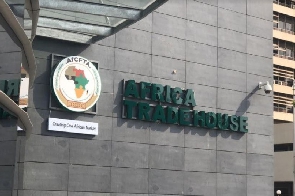 The AfCFTA Secretariat was commissioned in Accra in September, this year
The AfCFTA Secretariat was commissioned in Accra in September, this year
Naa Amanua Williams, the Owner and Head Designer at Emma Bird Handmade Jewellery and Accessories and successful Ghanaian exporter of jewelries and accessories made from cut garments has lamented the cost of logistics in Africa which has been a major disincentive for intra-continental trade.
According to her, the various transportation charges and their accompanying inconsistencies along the African corridor, makes it difficult for Ghanaian exporters to make meaningful profits after business transactions.
“The demand is there, but the difficulty is trying to move the goods without incurring extra charges,” she bemoaned.
She said it is one of the reasons Ghanaian traders have resorted to trade with the West, in Europe and the Americas, where logistics is more affordable.
Speaking on the Eye on Port program, on how to promote value addition to Ghana’s exports to remain competitive in a continental economy, Naa Amanua Williams, expressed hope that the AfCFTA will address that and other trade facilitation issues.
“The reasons we are not trading with countries within Africa is because of the cost of logistics. And if this is going is to be eliminated, Africa us going to be enough for my business to trade. Nigeria is huge, Kenya is huge. We might not even be able to meet the demand.”
Also speaking on Eye on Port, the Principal Advisor at the United Nations Economic Commission of Africa, Dr. Atta-Mensah argued that it is advisable to commence the ACFTA implementation and address the accompanying trade facilitation challenges as they emerge.
He assured that the AfCFTA will address many of these non-tariff barriers to trade.
He explained that such inconsistencies in charges across the countries in the continent come as a result of differences in mode of operations within each country, however, he encouraged that competition will naturally eliminate these bottlenecks.
“For example, if one country presents bottlenecks in trade, another country might seize the opportunity to move these impediments,” he cited.
While mentioning exchange rate disparities as possible reasons to the varying cost of logistics, Dr. Atta Mensah also mooted the idea of an eventual harmonization of currencies.
He also urged the Ghana Government to consider creating an enticing atmosphere that would work towards making Ghana the financial hub within the AfCFTA, similar to that of New York.
“Ghana should begin to look at the possibility of taking advantage of this trade area secretariat here in Ghana, to create a financial hub. This would attract the best banks and bankers, lawyers, and this would eventually help create jobs. It would also boost trade financing,” he articulated.
Contributing to the subject on the program, the Director of Projects at Ghana Exports Promotion Authority, Alexander Dadzawa said works are advanced to make Ghana an aviation hub where many airlines will establish and that would definitely have an impact on the cost of export logistics which would benefit Ghanaian exporters.
He also said discussions have been made to consider the dedication of an African shipping line, dedicated to imports and exports within the continent, and that would also cut down the cost of transportation of goods traded in Africa.
“We want to have a continental shipping facility that all the countries can take advantage of. Right now that is limited. If you want to export to the Southern African countries, for example, there is no direct line there,” he expressed.
Naa Amanua Williams, who is also represented SheTrades Commonwealth Initiative which seeks to connect about three (3), million women, to Trade by 2021, also called for the National Exports Development Strategy, and the Continental Trade Protocols, in attempts to improve trade, to address SDG-related issues, like women empowerment.
The Principal Advisor at the United Nations Economic Commission of Africa, Dr. Joseph Atta-Mensah added to her calls and appealed for a newer approach to education that would particularly factor in entrepreneurship.
According to him, that would not only improve innovation in exports but will also address the major unemployment challenge of society.